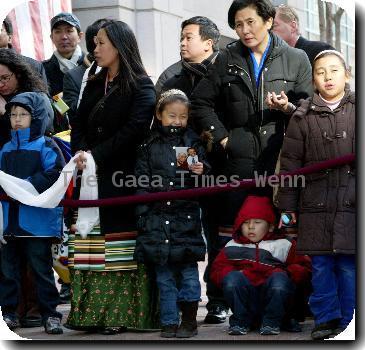AP Interview: Brazil’s leader pledges active role in Mideast diplomacy, pushes talks with Iran
By Alan Clendenning, APWednesday, March 10, 2010
AP Interview: Brazil leader seeks peace in Mideast
BRASILIA, Brazil — Brazil’s president plans an active role in world diplomacy during his final months in power, saying he will visit the Middle East to seek peace and prevent a possible conflict over Iran’s nuclear program.
President Luiz Inacio Lula da Silva, whose second four-year term ends next Jan. 1, told The Associated Press in an interview Tuesday that U.S.-backed sanctions could push Iran away from the bargaining table.
“I’m visiting the Middle East now and Iran in May. I want to talk with the entire world to strengthen the idea that dialogue offers the best opportunities for peace in the Middle East,” said Silva, who has emerged as one of the world’s most popular leaders by managing to stay on good terms with both Washington and its rivals, such as Cuba and Iran.
Silva, a former radical union leader and political dissident who surprised many by embracing free-market economics after taking office in 2003, says Brazil’s role in Middle East diplomacy shows its growing global prominence.
Underscoring his push to give Brazil greater global influence, Silva plans to visit Israel, Jordan and the Palestinian-administrated West Bank this week, and Iran in two months.
Brazil’s leader said he will try to persuade Iranian President Mahmoud Ahmadinejad to restart negotiations and ease concerns about his country’s nuclear program. Ahmadinejad met Silva last year in Brazil, a visit that alarmed Washington.
“I have already told them that a war must be avoided at all costs,” Silva said, a week after rebuffing U.S. Secretary Hillary Clinton’s appeal for Brazilian support for a new round of tough sanctions.
Iran has accelerated its nuclear program despite previous U.N. penalties, but the United States and some of its allies say a renewed demonstration of world resolve could finally push Iran to negotiate. Silva calls that view wrong, saying new sanctions could isolate Iran and raise regional tensions.
“We don’t want to repeat in Iran what happened in Iraq,” Silva said.
Silva has led Latin America’s largest nation to an increasingly assertive international role, based partly on growing economic importance and the discovery of major oil fields. He has also become a voice for the world’s emerging countries, demanding they have a greater say in world affairs.
Silva cited the Iran standoff and the struggling Mideast peace process as proof that the world’s traditional powers aren’t able to solve problems on their own.
“Who decided that the United States, France, England, China and Russia represent the collective aspirations of our planet, the new geopolitics, the new world order — with nations that were poor yesterday but today are in the midst of extraordinary economic growth?” asked Silva, who has campaigned for a permanent Brazilian seat on the U.N. Security Council.
Silva said Brazil’s message is that it is time for negotiations. “It’s not time for an embargo, not for sanctions. It’s time for us to talk a little more,” he said.
But he also indicated Brazil’s position on sanctions is not set in stone.
“If the president of Iran does not agree with Brazil, we will take our decisions based on what was discussed,” Silva said.
He criticized Ahmadinejad’s repeated questioning of the Holocaust and his calls for Israel’s destruction, but suggested political tensions are to blame for the inflammatory remarks.
“It’s impossible to imagine someone saying there wasn’t a Holocaust or to accept someone saying they’re going to do away with another country,” Silva said. “All these things surface because the situation is very radicalized, it needs to be calmed down.”
Touching on another sensitive issue, Silva said he reluctantly accepts the decisions of Cuba’s judicial system in jailing dissidents who have subsequently gone on hunger strikes.
“We have to respect the determinations of Cuba’s judiciary and government in detaining people under Cuban legislation, as I would want them to respect Brazil’s,” he said.
Guillermo Farinas has been on a hunger strike since Feb. 24 to demand the release of ailing Cuban political detainees. Dissident Orlando Zapata died in February amid a prolonged hunger strike, while Silva was in Havana visiting President Raul Castro.
“I wish that (the detention of political prisoners) did not happen, but I cannot question the reasons why Cuba detained them, just as I wouldn’t want Cuba to question why there are prisoners in Brazil,” he said.
Silva himself carried out a hunger strike against Brazil’s 1964-1985 dictatorship, an action he now calls “insanity.”
Silva, the son of a dirt-poor farmer, once worked as a shoeshine boy and gained fame as a radical union leader who resisted Brazil’s dictatorship. He surprised detractors after becoming president by maintaining financial policies applauded by Wall Street, while shelling out billions in government money for social programs that have helped lift millions out of poverty in this nation of 190 million people.
Few nations shook off the recent global meltdown more quickly than Brazil, which went into a brief recession but has emerged with a strong growth outlook.
Silva, whose popularity is high in Brazil, insisted that his hand-picked candidate in the presidential race, Dilma Rousseff, is ready for the presidency even if she has never run for office.
She is likely to face Sao Paulo state Gov. Jose Serra in October’s election.
“Why did I select a woman and not a man? Because I believe that we’ve won this stage of discrimination against women. If it exists, it’s the minority in the heads of reactionaries,” Silva said.
Tags: Brasilia, Brazil, Caribbean, Cuba, Government Programs, Hillary Clinton, Iran, Latin America And Caribbean, Middle East, North America, Protests And Demonstrations, South America, United States

